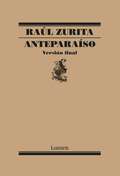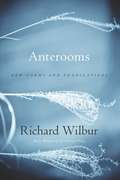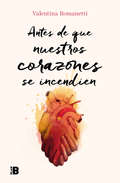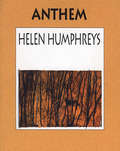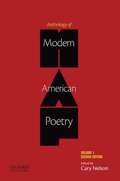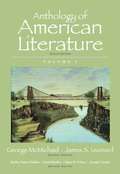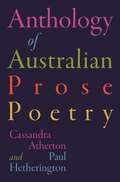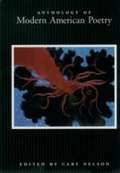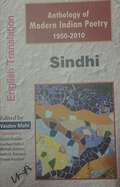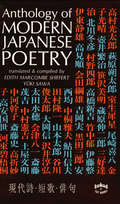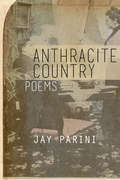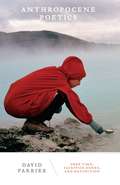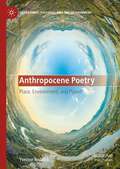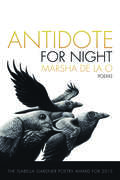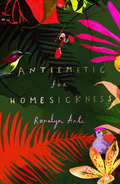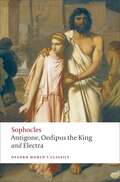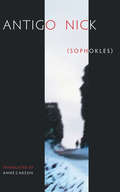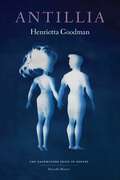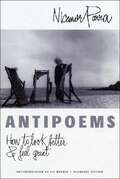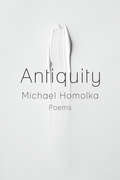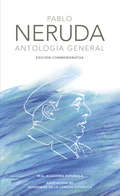- Table View
- List View
Antarpatt
by Mohan Madhikar1996ના ‘સેવાદિન’ (1લી સપ્ટેમ્બર: જુગતરામભાઈનો જન્મદિન) નિમિત્તે જુગતરામભાઈ દવેનાં વીણેલાં કાવ્યોનું પુસ્તક પ્રગટ કરવાનું ઠરાવેલું. પાંચેક વર્ષ પૂર્વે—એમના જન્મશતાબ્દી વર્ષે એમનાં વેરાયેલાં કાવ્યો સંશોધન કરી મેં એકત્રિત કર્યાં હતાં. તેમાંથી શ્રી ભીખુભાઈ વ્યાસ, શ્રી હર્ષકાન્તભાઈ વોરા તથા શ્રી ગભરુભાઈ ભડિયાદરા સાથે મળી અમે કાળના પ્રવાહમાં વિલીન થતાં બચાવી લેવા યોગ્ય, પોતાના પગ પર ઊભાં રહી શકે તેવાં તથા કવિના નોખા નોખા મિજાજનું દર્શન કરાવતાં કાવ્યો અહીં લીધાં છે. પસંદગીના કાર્યમાં વ્યક્તિગત રસ-રુચિ, ગમા-અણગમા ભાગ ભજવી શકે છે. કંઈક ઉદારતા દાખવી આટલાં કાવ્ય-પુષ્પો ચૂંટ્યાં છે.
Anteparaíso
by Raúl ZuritaVersión definitiva de un libro fundamental de Raúl Zurita, una obra una cumbre de la poesía en lengua castellana. Cuando Anteparaíso se publicó originalmente en 1982 supuso el arribo a cimas y el descenso a abismos impensados para la poesía en lengua castellana. Esta edición, que al cabo de cuarenta años el autor presenta en su “versión final”, revela cómo toda su alucinada energía, su violencia y su belleza desgarradas siguen no solo intactas, sino multiplicadas en los paisajes y amores, en los sueños y cielos que pueblan sus páginas.
Anterdaah
by Ramsagar SharmaThe poet sees a dream about changing earth and sky. Although it has no direct links with the real world, it makes a good attempt to let people know that they are always indebted to their motherland and this debt can't be ever paid.
Anterooms
by Richard WilburPoetry lovers and critics will rejoice at the news of this collection from Richard Wilbur, the legendary poet and translator who was called "a hero to a new generation of critics" by the New York Times Book Review, and whose work continues to be masterful, accomplished, whimsical, fresh, and important.A yellow-striped, green measuring worm opens Anterooms, a collection filled with poems that are classic Wilbur, that play with myth and form and examine the human condition through reflections on nature and love. Anterooms also features masterly translations from Mallarmé's "The Tomb of Edgar Allan Poe," a previously unpublished Verlaine poem, two poems by Joseph Brodsky, and thirty-seven of Symphosius's clever Latin riddles.Whether he is considering a snow shovel and domestic life or playfully considering that "Inside homeowner is the word meow," Wilbur's new collection is sure to delight everyone from longtime devotees to casual poetry readers. Exploring the interplay between the everyday and the mythic, the sobering and the lighthearted, Anterooms is nothing less than an event in poetic history and a remarkable addition to a master's oeuvre.
Antes de las 12
by María Stockli EsparducerTrocitos de alma que encontré abandonados en un grupo de Whatsapp. <P><P>Antes de las 12 es una recopilación de poemas en forma de mensajes, de palabras escritas en folios que se van consumiendo y de trocitos de alma que encontré abandonados en un grupo de Whatsapp.
Antes de que nuestros corazones se incendien
by Valentina RomanettiComo si el final no estuviera escrito, como si fuera la última vez, Antes de que nuestros corazones se incendien es mi declaración de amor. Soy Alba Pariente Bueno, nací en Rueda (Valladolid), tengo veintidós años y muchos sueños por cumplir. Estudio Publicidad y Relaciones Públicas, y la vida me ha traído a Madrid. Cuando era pequeña jugaba en el Parque Los Poetas. ¿Casualidad? No lo sé. Con nueve años escribí mis primeros poemas, y en plena adolescencia la vida me volvió a conducir a la poesía. Así nació Valentina Romanetti, mi voz silenciosa, pero la que más grita. Valentina es la valentía de Alba, y Romanetti es una bonita manera de decir que aun estando en ruinas, como Roma, puedes ser preciosa. Y esa valentía se transformó en las páginas de Vorágine, mi primer libro. Ahora, en Antes de que nuestros corazones se incendien, amaremos como si el final no estuviera escrito, como si fuera la última vez que el corazón nos deja hacerlo.
Anthem
by Helen HumphreysWinner of the 2000 Canadian Authors Association Award for Poetry and shortlisted for the 2000 Pat Lowther Award and the 2001 Milton Acorn Memorial People’s Poetry Prize Physical and fiercely lyric, Helen Humphreys' Anthem is a litany of want. A song of poverty and of desire, of the reach forward and the relentless backward glance. With stark images and subtle, tensile strength, her poems touch that rare interval between presence and absence, echo and answer, between wall and window and sky -- that gap in which we live, the space words make.
Anthology Of Modern American Poetry
by Cary NelsonAnthology of Modern American Poetry, Second Edition, contains poems by more than ninety American poets born before 1910, including many who have not been anthologized before. Editor Cary Nelson introduces students to a diverse selection of vital poetry, presenting both canonical and lesser-known selections by women, minority, Native American, and progressive writers only rediscovered in the past two decades. In addition to offering the most detailed annotations available in an anthology of this type and selected poems in the beautifully illustrated form in which they first appeared, this is also the first collection to give full treatment to American long poems and poem sequences. Ideal for courses in Modern American Poetry, American Literature, Modern Poetry, and American Studies, Anthology of Modern American Poetry introduces students our diverse poetic heritage.
Anthology of American Literature, Volume I, Tenth Edition
by George Mcmichael James S. LeonardThis two-volume anthology represents America's literary heritage from colonial times through the American renaissance to the contemporary era of post-modernism. Volume I offers early contextual selections from Christopher Columbus and Gaspar Perez de Villagra, as well as an excerpt from the Iroquois League’s Constitution of the Five Nations, and ends with an extensive selection of the poetry of Emily Dickinson.
Anthology of Australian Prose Poetry
by Paul Hetherington Cassandra AthertonProse poetry is a resurgent literary form in the English-speaking world and has been rapidly gaining popularity in Australia. Cassandra Atherton and Paul Hetherington have gathered a broad and representative selection of the best Australian prose poems written over the last fifty years. The Anthology of Australian Prose Poetryin cludes numerous distinguished prose poets; Jordie Albiston, Joanne burns, Gary Catalano, Anna Couani, Alex Skovron, Samuel Wagan Watson, Ania Walwicz and many more; and documents prose poetry's growing appeal over recent decades, from the poetic margins to the mainstream. This collection reframes our understanding not only of this dynamic poetic form, but of Australian poetry as a whole.
Anthology of Modern American Poetry
by Cary NelsonAnthology of Modern American Poetry contains more than 750 poems by 161 American poets, including many who have not been anthologized before.
Anthology of Modern Indian Poetry (1950-2010)
by Vasdev MohiA positive element evident in today’s poetry is creative use of language. There are many examples of new combinations, new constructions, touching, picturesque expressions, and unique examples of personification which have not found place in the earlier Sindhi poetry. The language used by poets in their poetry is such that it has become a part of its nervous system. Due to this factor creation appears to be breathing. It does not mean that in early poetry the creative language was not used but during that period the language was used only as a vehicle of expression, like a garment to create an effect and make it attractive. In contrast to this, today the language is used in such a manner that even slight pinch on a cell would damage the entire nervous system of the poetry. The language, being in itself a potent vehicle of manifestation, has now discarded the figures of speech, considered as ‘ornaments’ of the language earlier. Today’s creation does not depend on adornments. Today words of poetry are not signifiers, but are signified; they do not ‘state’, but ‘convey’ what is to be said. During progressive period the emphasis was on ‘what’ is said and in the post modernist poetry accent is on ‘how’ it is said. … Sindhi poetry is a continuous creative process in which with the passage of time much is cast off, much is brought in, and this goes on unabated.
Anthology of Modern Japanese Poetry
by Yuki Sawa Edith Marcombe ShiffertThe state of Japanese poetry in the twentieth century, its high quality and individuality is clearly shown in this book. The introduction gives a brief,lucid history of poetry in Japan, with the emphasis on modern poetry. The body of the book is taken up with the translation of the work of forty-nine widely acclaimed poets: free-verse poets, tanka poets, and haiku poets. At the back are notes giving illuminating biographical and literary information about each poet.The excellence of the translations and the lucidity of the introduction and notes make the book a treasure for poetry lovers everywhere .
Anthropocene Poetics: Deep Time, Sacrifice Zones, and Extinction (Posthumanities #50)
by David FarrierHow poetry can help us think about and live in the Anthropocene by reframing our intimate relationship with geological time The Anthropocene describes how humanity has radically intruded into deep time, the vast timescales that shape the Earth system and all life-forms that it supports. The challenge it poses—how to live in our present moment alongside deep pasts and futures—brings into sharp focus the importance of grasping the nature of our intimate relationship with geological time. In Anthropocene Poetics, David Farrier shows how contemporary poetry by Elizabeth Bishop, Seamus Heaney, Evelyn Reilly, and Christian Bök, among others, provides us with frameworks for thinking about this uncanny sense of time.Looking at a diverse array of lyric and avant-garde poetry from three interrelated perspectives—the Anthropocene and the &“material turn&” in environmental philosophy; the Plantationocene and the role of global capitalism in environmental crisis; and the emergence of multispecies ethics and extinction studies—Farrier rethinks the environmental humanities from a literary critical perspective. Anthropocene Poetics puts a concern with deep time at the center, defining a new poetics for thinking through humanity&’s role as geological agents, the devastation caused by resource extraction, and the looming extinction crisis.
Anthropocene Poetry: Place, Environment, and Planet (Literatures, Cultures, and the Environment)
by Yvonne ReddickAnthropocene Poetry: Place, Environment and Planet argues that the idea of the Anthropocene is inspiring new possibilities for poetry. It can also change the way we read and interpret poems. If environmental poetry was once viewed as linked to place, this book shows how poets are now grappling with environmental issues from the local to the planetary: climate change and the extinction crisis, nuclear weapons and waste, plastic pollution and the petroleum industry. This book intervenes in debates about culture and science, traditional poetic form and experimental ecopoetics, to show how poets are collaborating with environmental scientists and joining environmental activist movements to respond to this time of crisis. From the canonical work of Ted Hughes and Seamus Heaney, to award-winning poets Alice Oswald, Pascale Petit, Kei Miller, and Karen McCarthy Woolf, this book explores major figures from the past alongside acclaimed contemporary voices. It reveals Seamus Heaney’s support for conservation causes and Ted Hughes’s astonishingly forward-thinking research on climate change; it discusses how Pascale Petit has given poetry to Extinction Rebellion and how Karen McCarthy Woolf set sail with scientists to write about plastic pollution. This book deploys research on five poetry archives in the UK, USA and Ireland, and the author’s insider insights into the commissioning processes and collaborative methods that shaped important contemporary poetry publications. Anthropocene Poetry finds that environmental poetry is flourishing in the face of ecological devastation. Such poetry speaks of the anxieties and dilemmas of our age, and searches for paths towards resilience and resistance.
Antidote for Night
by Marsha de la OSet in present-day Southern California, Antidote for Night is a heartbreak lyric, a corrido, a love song to California's city lights and far-flung outskirts—the San Diego backcountry, the Central Valley, the Inland Empire, and the Mojave Desert. Marsha de la O's voice is a kind of free jazz, musically rich with LA noir and the vastness of metropolitan Southern California.Marsha de la O's Black Hope won the New Issues Prize from the University of Western Michigan and an Editor's Choice Award. She has taught Spanish-speaking children in Los Angeles and Ventura County for thirty years.
Antiemetic for Homesickness
by Romalyn Ante*Longlisted for the Swansea University Dylan Thomas prize 2021**Shortlisted for the Jhalak Prize 2021: A 'tour-de-force'**An Irish Times and Poetry School Book of the Year 2020*'A day will come when you won't missthe country na nagluwal sa 'yo.'- 'Antiemetic for Homesickness'The poems in Romalyn Ante's luminous debut build a bridge between two worlds: journeying from the country 'na nagluwal sa 'yo' - that gave birth to you - to a new life in the United Kingdom. Steeped in the richness of Filipino folklore, and studded with Tagalog, these poems speak of the ache of assimilation and the complexities of belonging, telling the stories of generations of migrants who find exile through employment - through the voices of the mothers who leave and the children who are left behind. With dazzling formal dexterity and emotional resonance, this expansive debut offers a unique perspective on family, colonialism, homeland and heritage: from the countries we carry with us, to the places we call home.'Moving, witty and agile' Observer'By turns playful and tender, offering a formally-various exploration of migration, community, and nursing... there is honesty, musicality, a powerful heart' Irish Times
Antigone, Oedipus the King, Electra (Oxford World's Classics)
by Sophocles Edith Hall H. D. F. KittoThis volume of Antigone, Oedipus the King, Electra contains three masterpieces by the Greek playwright Sophocles, widely regarded since antiquity as the greatest of all the tragic poets. The vivid translations, which combine elegance and modernity, are remarkable for their lucidity and accuracy, and are equally suitable for reading for pleasure, study, or theatrical performance. With this edition, readers are not only offered the most influential and famous of Sophocles' works in one volume, but they are presented with two plays dominated by a female heroic figure, and the experience of the two great dynasties featured in Greek tragedy--the houses of Oedipus and Agamemnon.
Antigonick
by Anne CarsonAn illustrated new translation of Sophokles' Antigone. Anne Carson has published translations of the ancient Greek poets Sappho, Simonides, Aiskhylos, Sophokles and Euripides. Antigonick is her seminal work. Sophokles' luminous and disturbing tragedy is here given an entirely fresh language and presentation. This paperback edition includes a new preface by the author, "Dear Antigone."
Antillia (The Backwaters Prize in Poetry Honorable Mention)
by Henrietta GoodmanWinner of the Backwaters Prize in Poetry Honorable Mention The title poem of this collection refers to the phantom island of Antillia, included on maps in the fifteenth century but later found not to exist. The ghosts that haunt this collection are phantom islands, moon lakes, lasers used to clean the caryatids at the Acropolis, earlier versions of the self, suicides, a madam from the Old West, petroleum, snapdragons, pets, ice apples, Casper, and a &“resident ghost&” who makes the domestic realm of &“the cradle and the bed&” uninhabitable. The ghosts are sons, fathers &“asleep in front of the TV,&” and a variety of exes—&“lost boys&” with names like The Texan and Mr. No More Cowboy Hat whom Henrietta Goodman treats with snarky wit but also with grief, guilt, and love. Although memories pervade this collection, these poems also look forward and outward into a world where social inequality and environmental disaster meet the possibility of metamorphosis.
Antipoems: How to Look Better & Feel Great
by Nicanor Parra Liz WernerThe first major collection in almost twenty years of new work by one of Latin America's greatest poets. "Real seriousness," Nicanor Parra, the antipoet of Chile, has said, rests in "the comic." And read in that light, this newest collection of his work is very serious indeed. It is an abundant offering of his signature mocking humor, subverting received conventions and pretensions in both poetry and everyday life, public and private, ingeniously and wittily rendered into English in an antitranslation (the word is Parra's) by Liz Werner. Of the fifty-eight pieces in Antipoems, the first twenty-three are taken from Parra's 1985 collection, Hojas de Parra ("Vine Leaves" or "Leaves of Parra"), two others appeared in his Paginas en Blanco ("Blank Pages," 2001), while the rest come straight out of his notebooks and have never been published before, either in Spanish or English. The book itself is divided into two sections, "Antipoems" (im)proper and a selection of Parra's most recent incarnation of the antipoem, the hand-drawn images of his "Visual Artefactos." As his anti-translator Liz Werner explains in her Introduction, Parra's scientific training infuses his work. "Viewed through the lens of antimatter," she writes, "antipoetry mirrors poetry, not as its adversary but as its perfect complement."
Antiquity
by Michael Homolka Mary Ruefle"The poems in Antiquity very much abandon themselves to language, to the collective poetic endeavor, and they do so in a rich, textured, and sustained voice."--Mary Ruefle, from the introduction Winner of the Kathryn A. Morton Prize, Michael Homolka's Antiquity offers the present infused with the past, from Ancient Greece to the Holocaust to contemporary battlefields. A haunting and evocative debut. Michael Homolka lives and works in New York City. Homolka's poems have appeared in the New Yorker, Ploughshares, the Threepenny Review, and elsewhere.
Antología general (Edición conmemorativa de la RAE y la ASALE #Volumen)
by Pablo NerudaLo mejor de la obra de Pablo Neruda en una antología preparada y avalada por la Real Academia Española y la Asociación de Academias de la Lengua Española. Un original itinerario cronológico por los escritos de Neruda, que entrelaza la prosa con la poesía, las cartas con los artículos periodísticos, y estos con las crónicas de viajes, hasta conformar una biografía vital y literaria del poeta a través de su obra. La compilación de la obra de Neruda ha estado a cargo del académico chileno Hernán Loyola, uno de los estudiosos del poeta más importantes, quien ha logrado perfilar una excelente guía para poder seguir, en doce capítulos, la aventura creadora del gran poeta. Los textos de Neruda vienen acompañados, además del de Loyola, de una serie de estudios de académicos de diversos países y de especialistas en la obra del poeta: Jorge Edwards, Alain Sicard, Selena Millares, Marco Martos Carrera, José Luis Vega, Pere Gimferrer, Andrés Gallardo, Francisco Brines y Eduardo Lizalde. La obra incluye un curioso texto inédito del poeta, la «Crónica de San Pancho», con el que el poeta quiso agradecer la protección que en 1948 le brindó una familia cuando era perseguido por sus ideas políticas. La crítica ha dicho sobre la colección de ediciones conmemorativas:«Un club [la colección de ediciones conmemorativas] que ya cuenta con invitados más que ilustres.»El País «Sean bienvenidas, por muchos motivos, estas ediciones conmemorativas auspiciadas por instituciones académicas del mayor rango. Unas ediciones que, por sus precios populares, y ahora que los buenos libros han pasado a ser un objeto de lujo, facilitan al gran público el acceso a unos autores que, paradójicamente, no por ser -clásicos- de la literatura en lengua castellana (antiguos o modernos) dejan de ser para algunos, aún hoy, unos grandes desconocidos.»El Imparcial
Antología general (Edición conmemorativa de la RAE y la ASALE #Volumen)
by Pablo NerudaLo mejor de la obra de Pablo Neruda en una antología preparada y avalada por la Real Academia Española y la Asociación de Academias de la Lengua Española. 50.º ANIVERSARIO DE LA CONCESIÓN DEL PREMIO NOBEL A PABLO NERUDA Un original itinerario cronológico por los escritos de Neruda, que entrelaza la prosa con la poesía, las cartas con los artículos periodísticos, y estos con las crónicas de viajes, hasta conformar una biografía vital y literaria del poeta a través de su obra. La compilación de la obra de Neruda ha estado a cargo del académico chileno Hernán Loyola, uno de los estudiosos del poeta más importantes, quien ha logrado perfilar una excelente guía para poder seguir, en doce capítulos, la aventura creadora del gran poeta. Los textos de Neruda vienen acompañados, además del de Loyola, de una serie de estudios de académicos de diversos países y de especialistas en la obra del poeta: Jorge Edwards, Alain Sicard, Selena Millares, Marco Martos Carrera, José Luis Vega, Pere Gimferrer, Andrés Gallardo, Francisco Brines y Eduardo Lizalde. La obra incluye un curioso texto inédito del poeta, la «Crónica de San Pancho», con el que el poeta quiso agradecer la protección que en 1948 le brindó una familia cuando era perseguido por sus ideas políticas. La crítica ha dicho sobre la colección de ediciones conmemorativas:«Un club [la colección de ediciones conmemorativas] que ya cuenta con invitados más que ilustres.»El País «Sean bienvenidas, por muchos motivos, estas ediciones conmemorativas auspiciadas por instituciones académicas del mayor rango. Unas ediciones que, por sus precios populares, y ahora que los buenos libros han pasado a ser un objeto de lujo, facilitan al gran público el acceso a unos autores que, paradójicamente, no por ser -clásicos- de la literatura en lengua castellana (antiguos o modernos) dejan de ser para algunos, aún hoy, unos grandes desconocidos.»El Imparcial

